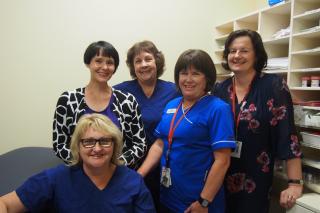- Home
- News
- Screening Matters, Issue 49, December 2014
- Initiatives result in major improvement in colposcopy DNAs
News
- Screening Matters Newsletter
- April 2019
- April 2018
- December 2017
- August 2017
- April 2017
- December 2016
- October 2016
- March 2016
- November 2015
- August 2015
- June 2015
- April 2015
- February 2015
- December 2014
- October 2014
- August 2014
- June 2014
- April 2014
- February 2014
- December 2013
- October 2013
- August 2013
- June 2013
- April 2013
- February 2013
Screening Matters
The National Screening Unit newsletter
In this issue:
- Reflecting on 2014
- Initiatives result in major improvement in colposcopy DNAs
- Breast cancer experience provides a unique perspective on the importance of screening
- The benefits of timely newborn metabolic screening (Guthrie test)
- Technology helps bring Northland smear taker nurses together
- Module 1 of Antenatal and Newborn Screening E-learning resource updated
Initiatives result in major improvement in colposcopy DNAs

Charge nurse manager of gynaecology services Nicki Forrest-McLernon says in 2011, demand for colposcopy services exceeded capacity, there was a long waiting list and women with multiple DNAs – as many as ten in some cases.
‘No matter how many appointments we sent to some women, it didn’t increase the likelihood they’d attend, so not only were those appointments wasted, but the women weren’t having their colposcopies,’ says Nicki.
‘Even though our overall DNA rate met the National Screening Unit’s guidelines for providing a colposcopy service, we knew we could make more appointments available if we could reduce the number of DNAs.
‘We consulted widely and reviewed our DNA management process to make it more patient-centred.’
Changes included following up with women who hadn’t confirmed their appointment, having an appointment confirmation email address and sending women a text reminder 24-hours before their appointment. After two DNAs, a woman is discharged back to the care of her general practitioner.
As a result, the overall DNA rate has gone from around 14 percent to just under 5 percent in the last two years.
‘More women are attending their appointments so our clinics are fuller and we don’t have as many wasted appointments.’
Nicki says initially there was some concern about discharging women with two DNAs back into the care of their GPs. ‘But often receiving that letter has been the trigger for them to come for their colposcopy appointment, which is free, rather than pay to go and see their GP again. It also means women aren’t in limbo, with the GP thinking they’ve had their colposcopy when they haven’t.’
She says improving the service is an ongoing process, with a recent focus on Māori and Pacific women’s DNAs, which haven’t decreased as much as the overall rate. ‘We tried holding one clinic a month for just Māori women, but attendance didn’t increase.’
A telephone survey of DNA women was carried out recently to gain a better understanding of the barriers for them.
Nicki says some of the results were surprising. ‘We had thought lack of childcare and transport might be major issues, but they weren’t. The cost of a phone call to confirm the appointment was an issue and there was a positive response to having an 0800 number to confirm appointments. We’re about to introduce that for a trial period of six months to see what difference it makes.
‘We’re also looking at the feasibility of having more flexible appointment times. Some women say they’d like an appointment after 4pm because they have difficulty getting time off work, needed more notice to take annual leave or had to use their sick leave.’
The Christchurch colposcopy DNA team, pictured above is, from left front, hospital aide Paula Armstrong, colposcopy administrator Susie Angelo, lead colposcopy nurse Maureen Fletcher, charge nurse manager of gynaecology services Nicki Forrest-McLernon and gynaecology quality coordinator Cathy Rewiri.
To receive the Screening Matters newsletter by email, fill out our sign-up form.

